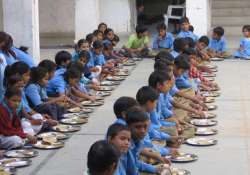CAG slams Arunachal Government for failure in implementing Mid-Day Meal scheme
Itanagar: The Comptroller and Auditor General of India (CAG) has criticised the Arunachal Pradesh education department for its failure in successful implementation of the Mid-Day Meal (MDM) scheme in the state.The Centre launched the MDM

Itanagar: The Comptroller and Auditor General of India (CAG) has criticised the Arunachal Pradesh education department for its failure in successful implementation of the Mid-Day Meal (MDM) scheme in the state.
The Centre launched the MDM scheme in August 1995 with the primary objective of boosting universalisation of primary education by increasing enrolment, retention and attendance and simultaneously improving nutritional status of primary
school children.
The CAG report, which was tabled in the state Assembly yesterday by Chief Minister Nabam Tuki, attributed inadequate financial management, short-lifting of food grain, delay in release of funds, inadequate infrastructural facilities and lack of monitoring as the reasons for failure of the scheme.
The CAG highlighted that no household surveys were conducted to identify the total number of children enrolled at the primary stage and no attempts were made to encourage high level of enrolment through publicity.
The report stated that in 2010-11, against the Centre's allocation of 6,687.66 MT of food grain for primary and upper primary levels, the department lifted only 5,928.37 MT and during 2013-14, against an allocation of 6,625.01 MT, only 6,598.95 MT was lifted leading to short-lifting of 785.35 MT of food grain.
”There was a shortfall in provision of 47,360 meals due to short receipt of food grain in 137 schools in the state,” the report pointed out, adding, in six schools of West Kameng and Lohit district, 46.61 quintals (23 per cent) of the allotted rice was issued as dry ration, instead of cooked meals, violating directives of the Supreme Court. The CAG report said, of 150 test-checked schools, pucca kitchen sheds were not available in 130 (87 per cent) schools, drinking water facilities in 35 schools (23 per cent), gas-based chullahs in 148 schools (99 per cent) and cooking utensils in 9 schools (6 per cent).
The report revealed from 2009 to 2014, there were persistent savings ranging from one to 32 per cent, while during the same period there were delays ranging up to 21
months in release of central assistance by the state government to the nodal department.
”The state government did not contribute its share aggregating to Rs 12.93 crore towards conversion costs, honorarium to cooks and MME costs,” the report pointed out, adding, there were deficiencies in meetings of the state, district and block level monitoring cells to monitor implementation of the scheme.
The report recommended the state government to ensure preparation of annual work plans and budget (AWP&B) with authenticated inputs and ensure strict compliance to all pre-requisites and to streamline and simplify existing procedure to ensure timely transmission of funds to the implementing agencies.
It also suggested to strengthen the monitoring mechanism and supervision of the scheme and enforce effectively at all levels to secure accountability at various levels of programme implementation.
”Requirements of food grain should be assessed on the basis of reliable inputs from the school level and allotted quantities of food grain should be lifted and distributed on a timely basis,” the report added.